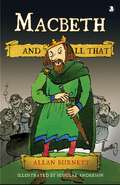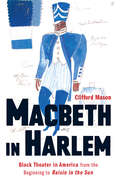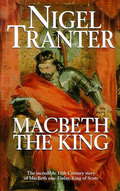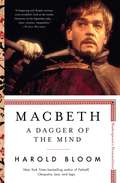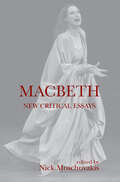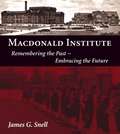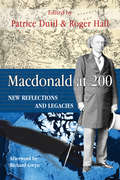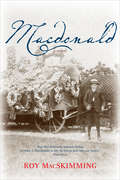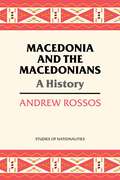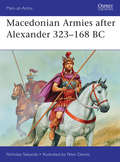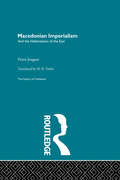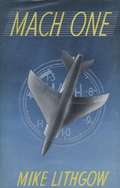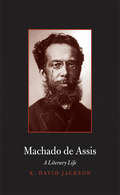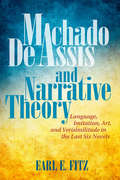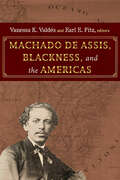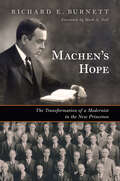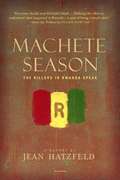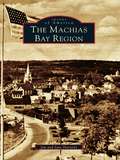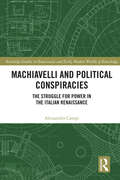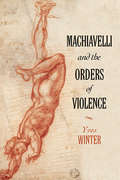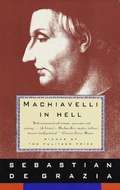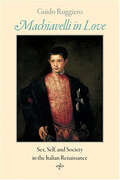- Table View
- List View
Macbeth and All That (The And All That Series)
by Allan BurnettThe illustrated true history of the 11th-century Scottish king made famous by William Shakespeare&’s play.Macbeth And All That is a real-life adventure packed with historical facts about Scotland&’s infamous king. Journey back to the dark ages where the throne is splattered in blood and death lurks in every corner. Join Macbeth&’s quest for power—and find out why the truth is very different from the way Shakespeare told it. Groaning with great illustrations, Macbeth And All That is a chilling murder mystery that will keep you guessing to the very end!
Macbeth in Harlem: Black Theater in America from the Beginning to Raisin in the Sun
by Clifford MasonIn 1936 Orson Welles directed a celebrated all-black production of Macbeth that was hailed as a breakthrough for African Americans in the theater. For over a century, black performers had fought for the right to perform on the American stage, going all the way back to an 1820s Shakespearean troupe that performed Richard III, Othello, and Macbeth, without relying on white patronage. "Macbeth" in Harlem tells the story of these actors and their fellow black theatrical artists, from the early nineteenth century to the dawn of the civil rights era. For the first time we see how African American performers fought to carve out a space for authentic black voices onstage, at a time when blockbuster plays like Uncle Tom’s Cabin and The Octoroon trafficked in cheap stereotypes. Though the Harlem Renaissance brought an influx of talented black writers and directors to the forefront of the American stage, they still struggled to gain recognition from an indifferent critical press. Above all, "Macbeth" in Harlem is a testament to black artistry thriving in the face of adversity. It chronicles how even as the endemic racism in American society and its theatrical establishment forced black performers to abase themselves for white audiences’ amusement, African Americans overcame those obstacles to enrich the nation’s theater in countless ways.
Macbeth the King
by Nigel TranterAcross a huge colourful canvas, ranging from the wilds of Scotland toNorway, Denmark and Rome, here is the story of the real MacBeth.Set aside Shakespeare's portrait: read instead of his struggle to makeand save a united Scotland.In this impressively researched and vivid portrayal, Tranter belies thepopular perception of a savage, murderous ambitious king. Instead, hetells of MacBeth's struggle to make and save a united Scotland; hisdevotion to his great love, the young Queen Gruoch; the humane laws theyfought for; the great battle they were forced to fight. And the terribleprice they paid.
Macbeth the King
by Nigel TranterAcross a huge colourful canvas, ranging from the wilds of Scotland toNorway, Denmark and Rome, here is the story of the real MacBeth.Set aside Shakespeare's portrait: read instead of his struggle to makeand save a united Scotland.In this impressively researched and vivid portrayal, Tranter belies thepopular perception of a savage, murderous ambitious king. Instead, hetells of MacBeth's struggle to make and save a united Scotland; hisdevotion to his great love, the young Queen Gruoch; the humane laws theyfought for; the great battle they were forced to fight. And the terribleprice they paid.
Macbeth: A Dagger of the Mind (Shakespeare's Personalities #5)
by Harold BloomFrom the greatest Shakespeare scholar of our time, comes a portrait of Macbeth, one of William Shakespeare’s most complex and compelling anti-heroes—the final volume in a series of five short books about the great playwright’s most significant personalities: Falstaff, Cleopatra, Lear, Iago, Macbeth.From the ambitious and mad titular character to his devilish wife Lady Macbeth to the moral and noble Banquo to the mysterious Three Witches, Macbeth is one of William Shakespeare’s more brilliantly populated plays and remains among the most widely read, performed in innovative productions set in a vast array of times and locations, from Nazi Germany to Revolutionary Cuba. Macbeth is a distinguished warrior hero, who over the course of the play, transforms into a brutal, murderous villain and pays an extraordinary price for committing an evil act. A man consumed with ambition and self-doubt, Macbeth is one of Shakespeare’s most vital meditations on the dangerous corners of the human imagination. Award-winning writer and beloved professor Harold Bloom investigates Macbeth’s interiority and unthinkable actions with razor-sharp insight, agility, and compassion. He also explores his own personal relationship to the character: Just as we encounter one Anna Karenina or Jay Gatsby when we are seventeen and another when we are forty, Bloom writes about his shifting understanding—over the course of his own lifetime—of this endlessly compelling figure, so that the book also becomes an extraordinarily moving argument for literature as a path to and a measure of our humanity. Bloom is mesmerizing in the classroom, wrestling with the often tragic choices Shakespeare’s characters make. He delivers that kind of exhilarating intimacy and clarity in Macbeth, the final book in an essential series.
Macbeth: New Critical Essays (Shakespeare Criticism)
by Nick MoschovakisThis volume offers a wealth of critical analysis, supported with ample historical and bibliographical information about one of Shakespeare’s most enduringly popular and globally influential plays. Its eighteen new chapters represent a broad spectrum of current scholarly and interpretive approaches, from historicist criticism to performance theory to cultural studies. A substantial section addresses early modern themes, with attention to the protagonists and the discourses of politics, class, gender, the emotions, and the economy, along with discussions of significant ‘minor’ characters and less commonly examined textual passages. Further chapters scrutinize Macbeth’s performance, adaptation and transformation across several media—stage, film, text, and hypertext—in cultural settings ranging from early nineteenth-century England to late twentieth-century China. The editor’s extensive introduction surveys critical, theatrical, and cinematic interpretations from the late seventeenth century to the beginning of the twenty-first, while advancing a synthetic argument to explain the shifting relationship between two conflicting strains in the tragedy’s reception. Written to a level that will be both accessible to advanced undergraduates and, at the same time, useful to post-graduates and specialists in the field, this book will greatly enhance any study of Macbeth. Contributors: Rebecca Lemon, Jonathan Baldo, Rebecca Ann Bach, Julie Barmazel, Abraham Stoll, Lois Feuer, Stephen Deng, Lisa Tomaszewski, Lynne Bruckner, Michael David Fox, James Wells, Laura Engel, Stephen Buhler, Bi-qi Beatrice Lei, Kim Fedderson and J. Michael Richardson, Bruno Lessard, Pamela Mason.
Macdonald Institute
by James SnellMacdonald Institute traces the evolution of a small post-secondary institution specializing in the education of rural Ontario women into a world-respected, co-educational college at the University of Guelph. Built in 1903 with funds from Sir William Macdonald of Montreal, Macdonald Institute focused originally on the teaching of Domestic Science to rural women. "Mac" has evolved to meet the changing needs of women, the Canadian family and society in general. The Institute evolved into the College of Family and Consumer Studies in 1970 and its legacy is now an integral part of the College of Social and Applied Human Sciences. This book provides valuable insights into the education of women in Ontario in the twentieth century.
Macdonald at 200: New Reflections and Legacies
by Roger Hall Patrice DutilA modern look at a classic leader. Macdonald at 200 presents fifteen fresh interpretations of Canada’s founding Prime Minister, published for the occasion of the bicentennial of his birth in 1815. Well researched and crisply written by recognized scholars and specialists, the collection throws new light on Macdonald’s formative role in shaping government, promoting women’s rights, managing the nascent economy, supervising westward expansion, overseeing relations with Native peoples, and dealing with Fenian terrorism. A special section deals with how Macdonald has (or has not) been remembered by historians as well as the general public. The book concludes with an afterword by prominent Macdonald biographer Richard Gwyn. Macdonald emerges as a man of full dimensions — an historical figure that is surprisingly relevant to our own times.
Macdonald: A Novel
by Roy MacskimmingIn the grand literary tradition of Gore Vidal’s novels about American political history, Roy MacSkimming has conjured an extraordinary novelistic recreation of the last days of Canada’s indomitable first Prime Minister, Sir John A. Macdonald. Narrated by his private secretary, Joseph Pope, Macdonald opens with stirring scenes of Sir John fighting his last great election battle on issues that uncannily echo our national concerns today. The year is 1891, and there is a very real fear of absorption by the United States. Meanwhile, a political scandal in Quebec threatens to topple Sir John’s government. Exhausted by his electoral victory, the old leader fights to keep his iron grip over his party and life itself. Joseph Pope renders his chief in intimate detail, reveling the immense charm and personal magnetism that gave Macdonald such mastery over people and events. As the novel moves majestically towards his final hours, Sir John himself addresses the reader directly, reflecting on his past and present. The spellbinding narrative features a memorable cast of characters ranging from President Ulysses S. Grant, Louis Riel and Sir Wilfrid Laurier to Macdonald’s feisty second wife, Lady Agnes Macdonald, and their disabled daughter Mary. Convincingly grounded in the political and personal passions of the day, Macdonald delivers a brilliant and exciting portrait of a young emerging nation and its greatest champion. At once seductively evocative and emotionally engaging, this is historical fiction at its best.
Macedonia and the Macedonians: A History (Studies of Nationalities)
by Andrew RossosThis detailed volume surveys the history of Macedonia from 600 BC to the present day, with an emphasis on the past two centuries. It reveals how the so-called Macedonian question has long dominated Balkan politics, and how for well over a century and a half, it was the central issue dividing Balkan peoples, as neighboring Bulgaria, Greece, and Serbia struggled for possession of Macedonia—and denied any distinct Macedonian identity.
Macedonian Armies after Alexander 323-168 BC
by Peter Dennis Nicholas SekundaThe death of Alexander the Great in 323 BC threw the Macedonians into confusion; there was no capable heir, and no clear successor among the senior figures in Alexander's circle. Initial attempts to preserve the unity of Alexander's conquests gave way to a period of bloody and prolonged warfare. For well over a century the largely mercenary armies of Alexander's successors imposed their influence over the whole of the Near East, while absorbing local military practices. After Rome's decisive defeat of Carthage in 202 BC, Macedonia came under increasing pressure from the Romans. Three wars between the two powers culminated in the Roman victory at Pydna in 168 BC, which laid Alexander's empire to rest and established Roman hegemony in the Near East. Drawing upon a wide array of archaeological and written sources and written by a noted authority on the Hellenistic period, this survey of the organization, battle history and appearance of the armies of Alexander's successors is lavishly illustrated with specially commissioned full-colour artwork.
Macedonian Imperialism: Macedonian Imperialism And The Hellenization Of The East
by Pierre JouguetOriginally published between 1920-70,The History of Civilization was a landmark in early twentieth century publishing. It was published at a formative time within the social sciences, and during a period of decisive historical discovery. The aim of the general editor, C.K. Ogden, was to summarize the most up to date findings and theories of historians, anthropologists, archaeologists and sociologists. This reprinted material is available as a set or in the following groupings:* Prehistory and Historical Ethnography Set of 12: 0-415-15611-4: * Greek Civilization Set of 7: 0-415-15612-2: * Roman Civilization Set of 6: 0-415-15613-0: * Eastern Civilizations Set of 10: 0-415-15614-9: * Judaeo-Christian Civilization Set of 4: 0-415-15615-7: * European Civilization Set of 11: 0-415-15616-5:
Mach One
by Mike LithgowMike Lithgow joined the Fleet Air Arm in 1939. A year later he was flying from the deck of the ill-fated carrier Ark Royal.Lithgow flew in the attack which sank the Bismarck, and later was in the search for the Tirpitz. While on patrol in the South Atlantic his plane flew into the sea and he and his crew were left floating in their Mae Wests eight hundred miles from the nearest land...their rescue can only be described as miraculous.In 1945 Lithgow became a test pilot with Vickers Supermarine organisation; since 1948 he has been Chief Test Pilot.In his brilliant career with Vickers, Lithgow has flown the world demonstrating the prowess of that wonderful aircraft, the Swift, and its succeeding prototype, F525. His story is entertaining, intensely readable, and revealing of a very brave man.
Machado de Assis
by K. David JacksonNovelist, poet, playwright, and short story writer Joaquim Maria Machado de Assis (1839-1908) is widely regarded as Brazil's greatest writer, although his work is still too little read outside his native country. In this first comprehensive English-language examination of Machado since Helen Caldwell's seminal 1970 study, K. David Jackson reveals Machado de Assis as an important world author, one of the inventors of literary modernism whose writings profoundly influenced some of the most celebrated authors of the twentieth century, including José Saramago, Carlos Fuentes, and Donald Barthelme. Jackson introduces a hitherto unknown Machado de Assis to readers, illuminating the remarkable life, work, and legacy of the genius whom Susan Sontag called "the greatest writer ever produced in Latin America" and whom Allen Ginsberg hailed as "another Kafka. " Philip Roth has said of him that "like Beckett, he is ironic about suffering. " And Harold Bloom has remarked of Machado that "he's funny as hell. "
Machado de Assis and Narrative Theory: Language, Imitation, Art, and Verisimilitude in the Last Six Novels (Bucknell Studies in Latin American Literature and Theory)
by Earl E. FitzThis book makes the argument that Machado de Assis, hailed as one of Latin American literature’s greatest writers, was also a major theoretician of the modern novel form. Steeped in the works of Western literature and an imaginative reader of French Symbolist poetry, Machado creates, between 1880 and 1908, a “new narrative,” one that will presage the groundbreaking theories of Swiss linguist Ferdinand de Saussure by showing how even the language of narrative cannot escape being elusive and ambiguous in terms of meaning. It is from this discovery about the nature of language as a self-referential semiotic system that Machado crafts his “new narrative.” Long celebrated in Brazil as a dazzlingly original writer, Machado has struggled to gain respect and attention outside the Luso-Brazilian ken. He is the epitome of the “outsider” or “marginal,” the iconoclastic and wildly innovative genius who hails from a culture rarely studied in the Western literary hierarchy and so consigned to the status of “eccentric.” Had the Brazilian master written not in Portuguese but English, French, or German, he would today be regarded as one of the true exemplars of the modern novel, in expression as well as in theory. Published by Bucknell University Press. Distributed worldwide by Rutgers University Press.
Machado de Assis, Blackness, and the Americas (SUNY series, Afro-Latinx Futures)
by Vanessa K. Valdés; Earl E. FitzConsidered a genius in his own lifetime, Joaquim Maria Machado de Assis (1839–1908) is Brazil's most canonized writer. Yet, he remains a contested and even enigmatic figure to readers in Brazil and abroad, his relative silence on slavery leaving him vulnerable to charges of aspirations to whiteness. Machado de Assis, Blackness, and the Americas reconsiders this issue by exploring how his prose fiction has been received in the United States. In seven original essays, contributors re-examine his novels and short stories, as well as photographs of the writer, in order to better understand the strategies he employed to navigate Brazil's literary scene as a man of African descent. Framed by a contextualizing introduction and an afterword in the form of a conversation between the editors, the volume speaks to and with our own historical moment and the realities of Black lives in the Americas over the course of the last two centuries.
Machen's Hope: The Transformation of a Modernist in the New Princeton
by Richard E. BurnettThe first critical biography of J. Gresham Machen, examining the full arc of his intellectual career J. Gresham Machen is known as a conservative hero of the fundamentalist-modernist controversy. But was he always so staunchly antimodernist? In this sweeping new biography, Richard E. Burnett examines the whole of Machen&’s life and career—from his early years at Princeton, to his experience in the First World War, to his founding of Westminster Theological Seminary . Burnett pays special attention to topics that have received little attention from biographers, like Machen&’s crisis of faith and his support for historical criticism of Scripture. Incorporating all of Machen&’s major works as well as his previously unpublished private correspondence, Burnett crafts a nuanced narrative of Machen&’s intellectual journey from enthusiastic modernist to stalwart conservative. Nuanced and thorough, Machen&’s Hope will challenge scholars&’ assumptions about Machen and his dynamic era.
Machete Season: A Report
by Linda Coverdale Jean HatzfeldDuring the spring of 1994, in a tiny country called Rwanda, some 800,000 people were hacked to death, one by one, by their neighbors in a gruesome civil war. This book is a report by journalist Jean Hatzfeld, who traveled to Rwanda several years later, to interview ten participants in the killings, eliciting extraordinary testimony from these men about the genocide they perpetrated.
Machias Bay Region, The
by Jim Harnedy Jane HarnedyThe Machias Bay Region has a rich multicultural heritage. For eons, Native Americans of various tribes journeyed to the shores of the Machias Rivereach September for an annual gathering. The earliest European visitors to the region may have been Norsemen in the eleventh century. The French set up a trading post in 1605-1606 and the Pilgrims established an ill-fated trading post in 1733. Another early Machias settler was the infamous pirate Captain Samuel Bellamey. In 1763, Machias was successfully settled by a group of pioneers from Scarborough, who found in Machias an abundance of marsh hay, extensive forests, and a sheltered harbor. These brave pioneers later became American patriots when they fought and won the first naval engagement of the Revolutionary War on June 12, 1775.This wonderful photographic history captures how much, and yet how little has changed over the years. These photographs chronicle not only the richhistorical traditions of the area but also the shared sense of life's unbroken continuity in the towns of the Machias Bay Region: Cutler, East Machias, Jonesboro, Machias, Machiasport, Marshfield, Whiting, and Whitneyville. The book features old vessels docking for shipments of lumber, fishermen plying the waters for a catch, lumberjacks running logs, horses hauling timber through the snow, the Cross Island lifesaving station, women doing their wash at Schooner Brook, cattle contributing to the workforce, and folks raking blueberries, and tipping balsam branches and making wreaths. The legacy of our churches, schools, general stores, and county buildings are featured, as well as school sports teams. Photographs of our communities and people at both work and play depict an artistry of another era and a glimpse into the way life was.
Machiavelli
by Thomas Babington MacaulayOne hypothesis is that Machiavelli intended to practice on the young Lorenzo de' Medici a fraud similar to that which Sunderland is said to have employed against James II, and that he urged his pupil to violent and perfidious measures, as the surest means of accelerating the moment of deliverance and revenge.
Machiavelli and Political Conspiracies: The Struggle for Power in the Italian Renaissance (Routledge Studies in Renaissance and Early Modern Worlds of Knowledge)
by Alessandro CampiThe theme of conspiracy is central to Machiavelli's writing. His work offers observations and analysis of conspiracy as part of the armoury of the Renaissance politician. Surprisingly, the theme has not yet received the attention it merits. This volume corrects an interpretation which reduces Machiavelli's position to one of censorious observer of conspiracies. Quite to the contrary, as Campi demonstrates, Machiavelli developed an anatomy of conspiracy and provided a practical manual for coup d'état" and violent seizure of power.
Machiavelli and the Modern State
by Alissa M. ArditoThis book offers a significant reinterpretation of the history of republican political thought and of Niccol- Machiavelli's place within it. It locates Machiavelli's political thought within enduring debates about the proper size of republics. From the sixteenth century onward, as states grew larger, it was believed only monarchies could govern large territories effectively. Republicanism was a form of government relegated to urban city-states, anachronisms in the new age of the territorial state. For centuries, history and theory were in agreement: constructing an extended republic was as futile as trying to square the circle; but then James Madison devised a compound representative republic that enabled popular government to take on renewed life in the modern era. This work argues that Machiavelli had his own Madisonian impulse and deserves to be recognized as the first modern political theorist to envision the possibility of a republic with a large population extending over a broad territory.
Machiavelli and the Orders of Violence
by Yves WinterNiccolò Machiavelli is the most prominent and notorious theorist of violence in the history of European political thought - prominent, because he is the first to candidly discuss the role of violence in politics; and notorious, because he treats violence as virtue rather than as vice. In this original interpretation, Yves Winter reconstructs Machiavelli's theory of violence and shows how it challenges moral and metaphysical ideas. Winter attributes two central theses to Machiavelli: first, violence is not a generic technology of government but a strategy that tends to correlate with inequality and class conflict; and second, violence is best understood not in terms of conventional notions of law enforcement, coercion, or the proverbial 'last resort', but as performance. Most political violence is effective not because it physically compels another agent who is thus coerced; rather, it produces political effects by appealing to an audience. As such, this book shows how in Machiavelli's world, violence is designed to be perceived, experienced, remembered, and narrated.
Machiavelli in Hell
by Sebastian De GraziaIn this intellectual biography, de Grazia presents a new vision of Niccolo Machiavelli that evokes the great Florentine thinker's presence. After giving an engrossing account of Machiavelli's childhood and period of personal crisis that followed his imprisonment and torture, the book turns to an examination of The Prince.<P><P> Pulitzer Prize Winner
Machiavelli in Love: Sex, Self, and Society in the Italian Renaissance
by Guido RuggieroMachiavelli in Love introduces a complex concept of sex and sexual identity and their roles in the culture and politics of the Italian Renaissance. Guido Ruggiero's study counters the consensus among historians and literary critics that there was little sense of individual identity and almost no sense of sexual identity before the modern period. Drawing from the works of major literary figures such as Boccaccio, Aretino, and Castiglione, and rereading them against archival evidence, Ruggiero examines the concept of identity via consensus realities of family, neighbors, friends, and social peers, as well as broader communities and solidarities. The author contends that Renaissance Italians understood sexual identity as a part of the human life cycle, something that changed throughout stages of youthful experimentation, marriage, adult companionship, and old age. Machiavelli’s letters and literary production reveal a fascinating construction of self that is highly reliant on sexual reputation. Ruggiero's challenging reinterpretation of this canonical figure, as well as his unique treatment of other major works of the period, offer new approaches for reading Renaissance literature and new understandings of the way life was lived and perceived during this time.
